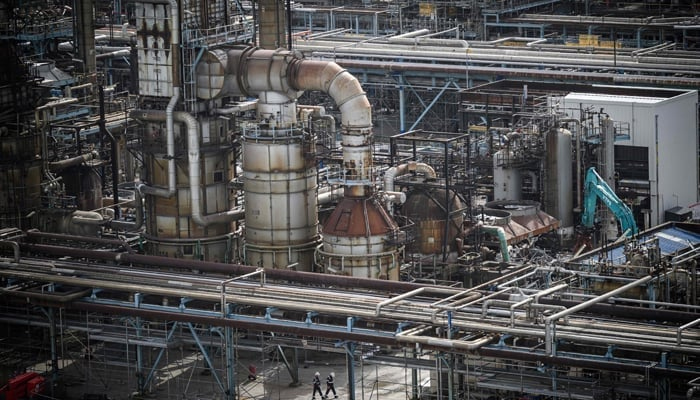Refineries gear up for Euro V shift, set to slash furnace oil output
Pakistan, having a total capacity of 20 million tonnes, cannot fully utilize its capacity due to the lower demand for FO in the country
KARACHI: Local refineries are poised to ramp up production of high-margin petroleum products, petrol and diesel, following a significant reduction in furnace oil output, in line with agreements made under the government’s Brownfield Refinery Policy.
The policy, crafted with input from the refinery industry, aims to align local production with Euro V standards, enhancing the output of motor spirit (MS) and diesel while curtailing furnace oil (FO) production.
“Pakistan Refinery Limited (PRL) has already signed the agreement for upgradation, and Attock Refinery Limited is expected to follow suit shortly,” industry sources told The News. Pakistan’s total average requirement for the last five years for petroleum products stands at 24 million tonnes, out of which 11.35 million tonnes have been produced locally while the rest (12.90 million tonnes) were imported, a report of Arif Habib Limited said.
Pakistan, having a total capacity of 20 million tonnes, cannot fully utilize its capacity due to the lower demand for FO in the country, amid a shift in the energy mix within the power sector. To note, refineries are unable to significantly change their production slate, hence reducing their throughput.
The government, being cognizant of the overall situation, announced a policy on August 17, 2023 for the upgradation of brownfield refineries, which was further amended for brownfield refineries in February 2024.
Refineries that endorse the policy will receive additional tariff protection or deemed duty incentives, amounting to 10 percent for Motor Spirit (MS) and 2.5 percent for diesel for seven years.
The upgradation policy is anticipated to enable refineries to increase total production of MS (99 percent) and diesel (47 percent). The production of furnace oil is expected to reduce by 78 percent.
The report said that the refinery sector is the backbone of industrial development and products being used in transportation, industrial use, power generation, and other energy products. Major types of refining processes are Hydro Skimming, conversion/cracking, and deep conversion.
Presently, in Pakistan, there are five oil refining companies, namely, Pak-Arab Refinery Limited (PARCO), Attock Refinery Limited (ATRL), National Refinery Limited (NRL), Pakistan Refinery Limited (PRL), and Cnergyico Pk Limited (CNERGY).
All refineries in Pakistan are based on Hydro skimming technology, except for PARCO, which has a mild conversion refinery.
In FY23, the country’s total refinery capacity was recorded at 20 million tonnes per annum (450,000 bpd), but the actual utilization was 10 million tonnes per annum (utilization: 50 percent). Whereas, the total demand in Pakistan was 21 million tonnes per annum, due to this Pakistan had to import 11 million tonnes in FY23.
The production slate of all existing local refineries consists of Naphtha, Motor Gasoline (MS), High-Speed Diesel (HSD), Furnace Oil (FO), Kerosene, Jet fuel (JP-1 & JP-8), High-Octane Blending Component (HOBC), Liquefied Petroleum Gas (LPG), and Light Diesel Oil (LDO).
With the change in the country’s energy mix over the last 3-4 years, furnace oil demand is plummeting amid lower offtakes from power generation companies. Due to this, refineries reduced their overall production, which resulted in lower utilization, the report said.
-
 Savannah Guthrie Sends Desperate Plea To Mom Nancy Kidnapper
Savannah Guthrie Sends Desperate Plea To Mom Nancy Kidnapper -
 NBA All-Star 2026 Shake-up: Inside The New USA Vs World Tournament Format
NBA All-Star 2026 Shake-up: Inside The New USA Vs World Tournament Format -
 Warner Bros Consider Reopening Deal Talks With Paramount, Says Reports
Warner Bros Consider Reopening Deal Talks With Paramount, Says Reports -
 Andrew Mountbatten Windsor Faces Future With UK MPs, Says Expert
Andrew Mountbatten Windsor Faces Future With UK MPs, Says Expert -
 Shamed Andrew Told 'nobody Is Above The Law' Amid Harrowing Silence
Shamed Andrew Told 'nobody Is Above The Law' Amid Harrowing Silence -
 Gisele Bundchen Melts Hearts With Sweet Bike Ride Glimpse Featuring Son
Gisele Bundchen Melts Hearts With Sweet Bike Ride Glimpse Featuring Son -
 Prince William Found Meghan Markle ‘quite Refreshing’ At Start
Prince William Found Meghan Markle ‘quite Refreshing’ At Start -
 Kate Middleton Knew Should Could Not Be ‘voice Of Reason’ With Prince Harry
Kate Middleton Knew Should Could Not Be ‘voice Of Reason’ With Prince Harry -
 Rihanna Has Wardrobe Malfunction At A$AP Rocky Fashion Show
Rihanna Has Wardrobe Malfunction At A$AP Rocky Fashion Show -
 Prince Harry Felt System Had ‘one Rule For Him, One For Prince William’
Prince Harry Felt System Had ‘one Rule For Him, One For Prince William’ -
 Jake Paul's Fiancée Sends Him Over The Moon Over Stunning Victory
Jake Paul's Fiancée Sends Him Over The Moon Over Stunning Victory -
 Harper Beckham Sends Valentine’s Love Amid Brooklyn Family Drama
Harper Beckham Sends Valentine’s Love Amid Brooklyn Family Drama -
 Why Prince William, Kate Middleton 'partnership' Is Important For Monarchy
Why Prince William, Kate Middleton 'partnership' Is Important For Monarchy -
 Katie Price Drama Escalates As Family Stays In Touch With Ex JJ Slater
Katie Price Drama Escalates As Family Stays In Touch With Ex JJ Slater -
 Critics Target Palace Narrative After Andrew's Controversy Refuses To Die
Critics Target Palace Narrative After Andrew's Controversy Refuses To Die -
 Sarah Ferguson’s Delusions Take A Turn For The Worse: ‘She’s Been Deserted’
Sarah Ferguson’s Delusions Take A Turn For The Worse: ‘She’s Been Deserted’




